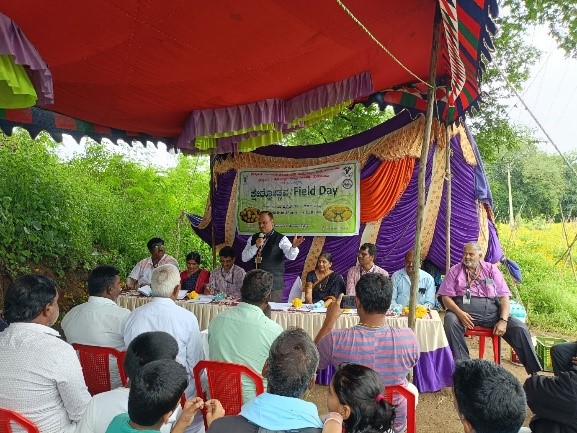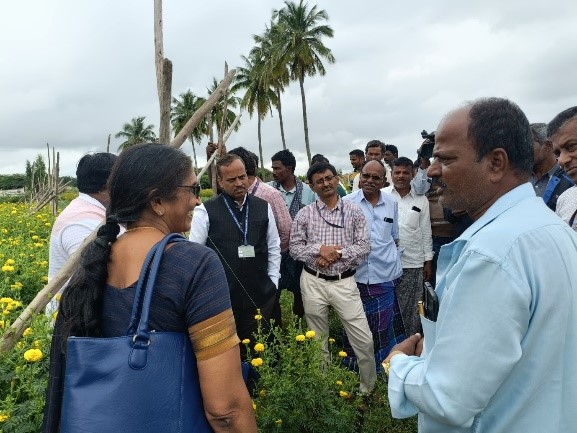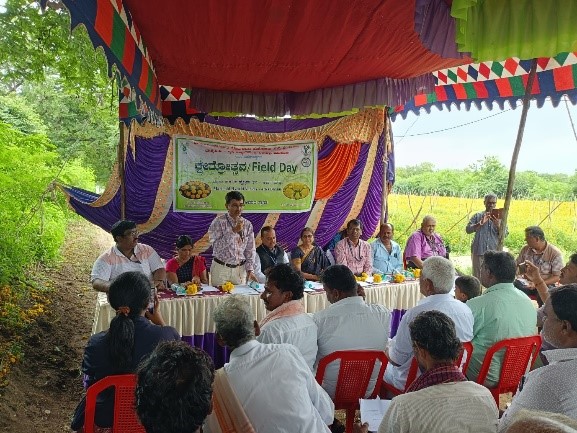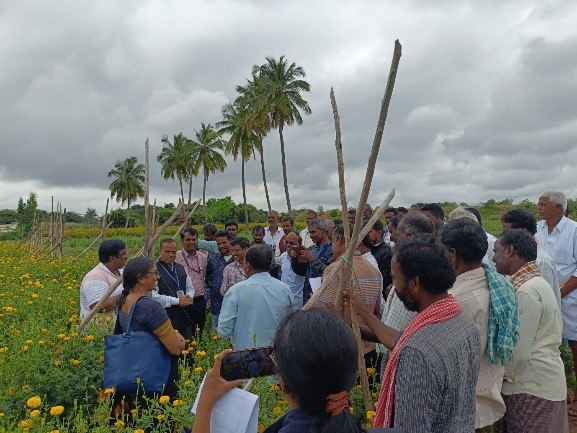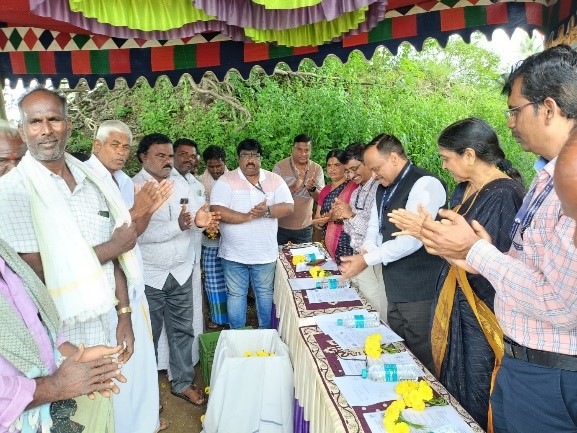
Field Day on Marigold Hybrid Arka Bhanu Organized by ICAR-KVK, Hirehalli on 15th October 2024
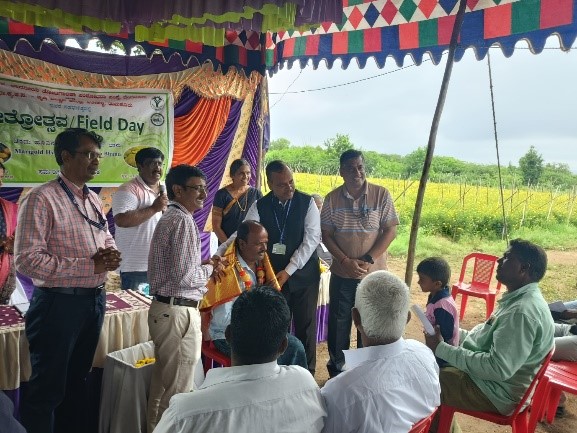
On 15th October 2024, ICAR-KVK, Hirehalli, in collaboration with ICAR-IIHR, Bengaluru, organized a successful Field Day focused on the Marigold Hybrid Variety Arka Bhanu at Nilamannahalli, Pavagada Taluk, Tumakuru District. The event aimed to raise awareness about the benefits of cultivating the high-yielding Arka Bhanu variety among the local farming community.
The program commenced at 11:00 AM with an impressive turnout of 98 enthusiastic farmers from nearby villages. The day began with a field visit to the Marigold Arka Bhanu plot of Shri Lakshminarayan Reddy, a progressive farmer from the region, providing participants with a hands-on look at the crop’s growth and performance under local conditions. The field visit set the stage for further discussions on the potential of Arka Bhanu to improve farmers’ livelihoods.
Dr. Tusar Kanti Behera, Director of ICAR-IIHR, Bengaluru, graced the event with his presence and inaugurated the program. In his address, Dr. Behera emphasized the importance of using quality seeds such as Arka Bhanu, developed by IIHR, to significantly enhance farmers’ incomes. He highlighted the research and development efforts by ICAR-IIHR that are directed towards empowering farmers by offering high-performing varieties and innovative farming technologies.
Dr. N. Loganandhan, Principal Scientist and Head of ICAR-KVK, Hirehalli, Tumakuru, spoke about the various benefits of adopting IIHR’s advanced horticultural technologies. He encouraged farmers to take advantage of these innovations to promote sustainable agriculture, focusing on improving crop productivity and resilience in the face of changing climatic conditions.
The scientific team also shared valuable insights with the farmers. Dr. Tejaswini, Principal Scientist, Division of Flower and Medicinal Crops, outlined the specific advantages of cultivating Arka Bhanu in the Pavagada region. She noted that this variety, known for its robust growth, high yield, and adaptability to local agro-climatic conditions, holds tremendous promise for increasing farmers’ profits.
Dr. Naveen Kumar, Head, Division of Flower and Medicinal Crops, further elaborated on the need for farmers to diversify their crops by incorporating flowers like Marigold into their farming systems. He emphasized that flower crops can play a crucial role in stabilizing farmers’ incomes, particularly in regions like Pavagada, where traditional crops alone may not offer adequate returns.
Dr. V.K. Jayaraghavendra Rao, Head (I/c), Division of Social Sciences and Training, urged the farmers to embrace IIHR varieties more broadly. He stressed that wider adoption of these scientifically-developed varieties could contribute significantly to boosting agricultural productivity and resilience in the region.
A highlight of the event was the special address by Shri Lakshminarayan Reddy, Progressive farmer who has successfully adopted Arka Bhanu. He shared his personal experience of cultivating the Arka Bhanu and spoke at length about its market potential, superior post-harvest value, and the ways it has positively impacted his income and livelihood. His testimony served as a motivational case study for other farmers, demonstrating how Arka Bhanu can serve as a game-changer in the rural economy of Pavagada.
The Field Day also provided a valuable platform for interaction between scientists and farmers. The program was effectively coordinated by Shri K.N. Jagdish, SMS (Agril. Extension), and Shri Prasanth JM, SMS (Horticulture), ICAR-KVK, Hirehalli, Tumakuru. Their efforts ensured that the event was a success, contributing to the promotion of Arka Bhanu cultivation in the region and fostering knowledge exchange that will benefit farmers in the long run.
Overall, the Field Day on Marigold Hybrid Arka Bhanu was a fruitful initiative, showcasing the potential of innovative agricultural practices and IIHR varieties to transform farming and improve livelihoods in Pavagada Taluk. The event left farmers inspired and better equipped to adopt new technologies and crop varieties that can enhance their agricultural output and economic well-being.
